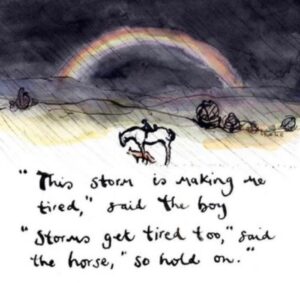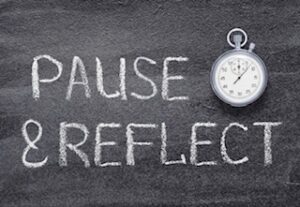 In a wonderful book entitled The Boy, the Mole, the Fox and the Horse by Charlie Mackesy, there are many quotes in it that touch me. One of them shows a boy on a horse and he clearly looks beleaguered. He says “This storm is making me tired”, to which the horse replies “Storms get tired too. So, hold on”. And this week’s Conflict Master Quest(ions) blog considers the storms we experience when we are in conflict and what that feels like.
In a wonderful book entitled The Boy, the Mole, the Fox and the Horse by Charlie Mackesy, there are many quotes in it that touch me. One of them shows a boy on a horse and he clearly looks beleaguered. He says “This storm is making me tired”, to which the horse replies “Storms get tired too. So, hold on”. And this week’s Conflict Master Quest(ions) blog considers the storms we experience when we are in conflict and what that feels like.
It’s an understatement to say our reactions to being in conflict are variable. The impact on us and how we respond may depend on the person with whom we are in dispute, what we are arguing about, how deeply hurt we feel, the range of other impacts we are experiencing, what values we perceive are being undermined, threatened or challenged , how often the same issues arise, and so on. And we are all very different in how we respond. Whatever we are experiencing – thinking and feeling- we are in a storm of sorts though and the impact has us whirling, scared, hyper-vigilant, and full of many other reactions including fatigue. The horse in the quote above is right – the storm gets tired too and that is an important metaphor to consider when it comes to heightened emotions and an escalation on a conflict we are in.
The degree to which we are reacting, the depth of our emotions, the intensity of the situation and dissension wanes over time and it is likely that when that happens we are in a better frame of mind and heart to be able to use calm instead of high emotions to see if things can be reconciled. This set of questions invites you to examine a storm you are in with another person.
- How might you describe the storm between you and the other person?
- What is whirling around you in this storm?
- How would you describe the feelings you are experiencing in the storm?
- What frightens you most?
- When the storm settles how do you want things to be?
- What will that feel like for you (your answer to the above question)?
- How might the other person describe the storm around them? What do you think might be whirling around them? What feelings might they be experiencing?
- On what may the two of you agree on?
- What do you think it would take for the storm to end between you too?
- How might you contribute to ending the storm? What contribution might you ask of the other person to help end the storm?
- What else occurs to you as you consider these questions?
- What insights do you have now that you didn’t have before you answered these questions?
(Popular – from the archives)



 Two things that come to mind that many of us have challenges with when someone provokes us, are how to pause and to reflect when emotions are bubbling up inside us and we cannot really think straight – if at all. More often than not we react and regret. Something the other person says or does – or doesn’t say or do – sets us off and we spiral downwards. At these times – at some level of our consciousness – we perceive the other person is undermining us, challenging us, questioning us, even threatening us! Something we needed or expected from them is not forthcoming. Something feels unstable within us and around us. Something we trusted – about the other person or ourselves – feels elusive. Something scares us and knocks us off our equilibrium. Many emotions take over – anger, disappointment, hurt, sadness, betrayal, shock, frustration, fear and so on.
Two things that come to mind that many of us have challenges with when someone provokes us, are how to pause and to reflect when emotions are bubbling up inside us and we cannot really think straight – if at all. More often than not we react and regret. Something the other person says or does – or doesn’t say or do – sets us off and we spiral downwards. At these times – at some level of our consciousness – we perceive the other person is undermining us, challenging us, questioning us, even threatening us! Something we needed or expected from them is not forthcoming. Something feels unstable within us and around us. Something we trusted – about the other person or ourselves – feels elusive. Something scares us and knocks us off our equilibrium. Many emotions take over – anger, disappointment, hurt, sadness, betrayal, shock, frustration, fear and so on.